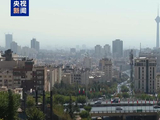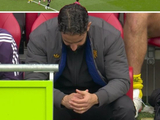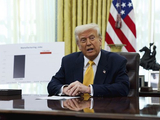Sanctions on Russia; France's Political Turmoil; China's Infrastructure; Yad Vashem Incident; Global Diplomatic Engagements
Global Sanctions on Russia: A Multi-Perspective Analysis
Recent events highlight a coordinated effort by the United States and European Union to impose new sanctions on Russia. According to United Daily News, U.S. President Joe Biden and EU representatives, including David O'Sullivan, are preparing a new round of sanctions targeting Russia’s shadow fleet and the energy sector. This marks the first collaborative sanction initiative since Biden’s return to the White House.
These developments indicate a significant escalation in diplomatic tensions, as noted by CCTV News. The report underscores Biden's readiness to implement a second phase of sanctions following Russia's extensive airstrikes on Ukraine. The CCTV article also features Russian spokesperson Dmitry Peskov’s dismissal of the sanctions' effectiveness, emphasizing Russia's resilience and ongoing military actions.
The news highlights the strategic nuances in the U.S.-EU approach. While UDN focuses on the specifics of the sanctions, including targeting Russia's energy transactions and insurance services, CCTV offers a broader geopolitical context, suggesting the sanctions may be more symbolic than impactful. CCTV also questions the internal U.S. political dynamics, hinting at potential reluctance within the U.S. administration to escalate tensions further.
It appears that both publications aim to inform their audiences of the geopolitical maneuvers while reflecting their respective national perspectives. UDN adopts a straightforward narrative, detailing the planned sanctions and potential impacts on Russia's economy. In contrast, CCTV provides a critical analysis, highlighting skepticism about the sanctions' efficacy and potential repercussions on U.S. interests.
Political Turmoil in France: A Leadership Crisis and Its European Implications
Recent events in France have highlighted a significant political upheaval, as Prime Minister Édouard Philippe's government failed to secure a vote of confidence in the National Assembly. This development, covered extensively by various media outlets, underscores the challenges facing France and its potential ripple effects across Europe.
Tencent News paints a vivid picture of the political instability in France, describing a nation in crisis as its government struggles to maintain fiscal discipline amidst mounting debt. The article criticizes the frequent changes in leadership, noting that France has had four prime ministers in just three years. The narrative suggests a country grappling with internal dissent and external pressures, likening the situation to a metaphorical storm.
Meanwhile, Sina News emphasizes the broader European context, quoting strategic analyst Metternich's famous phrase, "When France sneezes, Europe catches a cold." The article highlights the precarious state of the European Union, suggesting that France's internal turmoil could destabilize the region. It also notes the difficulty President Macron faces in appointing a new prime minister who can command a majority in the Assembly.
CCTV News provides a straightforward account of the confidence vote, detailing the numbers and the implications of Philippe's resignation. It underscores the fiscal challenges that led to the crisis, particularly the proposed budget cuts and the elimination of public holidays, which faced fierce opposition.
These developments indicate a shared recognition across media outlets of the gravity of France's political crisis. However, the narrative focus varies: while Tencent News delves into the chaotic domestic scene, Sina News contextualizes the crisis within a European framework, and CCTV News offers a factual recount of events. The intention behind these narratives appears to reflect each publication's audience priorities, with Tencent appealing to a domestic audience interested in governance challenges, Sina addressing regional stability concerns, and CCTV maintaining a neutral, informative stance.
China's Infrastructure Developments: A Tale of Two Projects
Recent events show significant advancements in China's infrastructure landscape, with two major projects making headlines. The first, as reported by Sina, highlights the inauguration of the first batch of 'Resource Loop Stations' in Tianjin Port Free Trade Zone by China Resources. These stations integrate recycling, electric vehicle battery swapping, and community services, forming a multi-functional urban infrastructure. The news highlights the project's digital approach through 'Internet + Recycling' tools, aiming to standardize and solve the recycling industry's 'small, scattered, and chaotic' issues.
Meanwhile, another article from Sina discusses the official operation of a supercritical coal-fired power project in Hubei Province, part of China's '14th Five-Year Plan'. This project, designed by China Energy Construction, emphasizes clean, low-carbon power generation, boasting a thermal efficiency of 48.91% and promising significant reductions in carbon emissions. It appears that this initiative not only meets local power demands but also aligns with China's dual carbon goals.
These developments indicate a concerted effort by China to innovate and enhance its infrastructure capabilities, balancing urban service integration with sustainable energy advancements. Both articles from Sina present a narrative focused on progress and modernization, reflecting China's strategic priorities in infrastructure and environmental sustainability.
Analysis of the Yad Vashem Shooting Incident Coverage
The tragic events at Yad Vashem have drawn significant media attention, with various outlets offering differing perspectives on the incident. Tencent News reports a deadly attack on a public bus in Yad Vashem, resulting in at least six fatalities and numerous injuries. The attackers, identified as young Palestinian militants, utilized a Carl Gustaf M/45 submachine gun, a weapon commonly seen among militant groups in the region. The report emphasizes the chaos and terror experienced by the victims and the immediate reactions of the Israeli security forces, who swiftly responded by encircling nearby villages to conduct searches and interrogations.
In contrast, CCTV News provides a more concise account, noting the arrest of a local resident suspected of assisting the attackers. This article highlights the attackers' origins from the West Bank and their previous confrontations with law enforcement, suggesting a pattern of militancy. The CCTV report appears to focus more on the procedural aspects of the investigation and the legal implications for the suspects, indicating a preference for a narrative that underscores law enforcement efforts and the challenges faced by security agencies.
While both articles cover the same event, Tencent's report offers a more dramatic and detailed narrative, possibly aiming to evoke a stronger emotional response from readers. In contrast, CCTV's coverage is more reserved, focusing on the legal and procedural developments following the attack. This difference in coverage reflects the distinct editorial priorities of each outlet, with Tencent emphasizing the human impact and immediate chaos, whereas CCTV underscores the broader security and legal context.
Diplomatic Engagements and Strategic Positioning: A Comparative Analysis of Recent Global Developments
Recent events show that Chinese President Xi Jinping attended the BRICS summit in Brazil, emphasizing the importance of multilateralism and cooperation among southern nations. According to the Foreign Ministry of China, Xi's speech highlighted the acceleration of global changes and the challenges posed by unilateralism and protectionism. He proposed enhancing open cooperation and maintaining a multilateral trade system, urging BRICS countries to strengthen ties to better face external risks.
In contrast, the United Daily News reports on Huang Renxun, CEO of Nvidia, accompanying US President Biden to the UK. This visit underscores Nvidia's strategic interests in easing export regulations to China, especially concerning AI chips, to maintain the US's leadership in AI competition. The presence of industry leaders like Sam Altman from OpenAI and Tim Cook from Apple at this state visit signals a broader agenda to align technology and trade interests with diplomatic efforts.
These developments indicate a nuanced geopolitical landscape where China is advocating for a collective, inclusive approach to global governance, while the US is leveraging its corporate giants to negotiate trade and technological advantages. The Chinese narrative, as depicted by their Foreign Ministry, positions BRICS as a counterbalance to Western dominance, focusing on equitable global governance and development. Meanwhile, the US engagement with tech CEOs suggests a strategy of integrating economic diplomacy with technological leadership to reinforce its global influence.
It appears that both nations are maneuvering to secure their positions in a rapidly evolving world order, with China emphasizing solidarity and multilateralism, and the US focusing on the strategic deployment of its technological prowess. This dual approach reflects the ongoing great power competition, where economic, technological, and diplomatic tools are employed to shape future global alignments.



